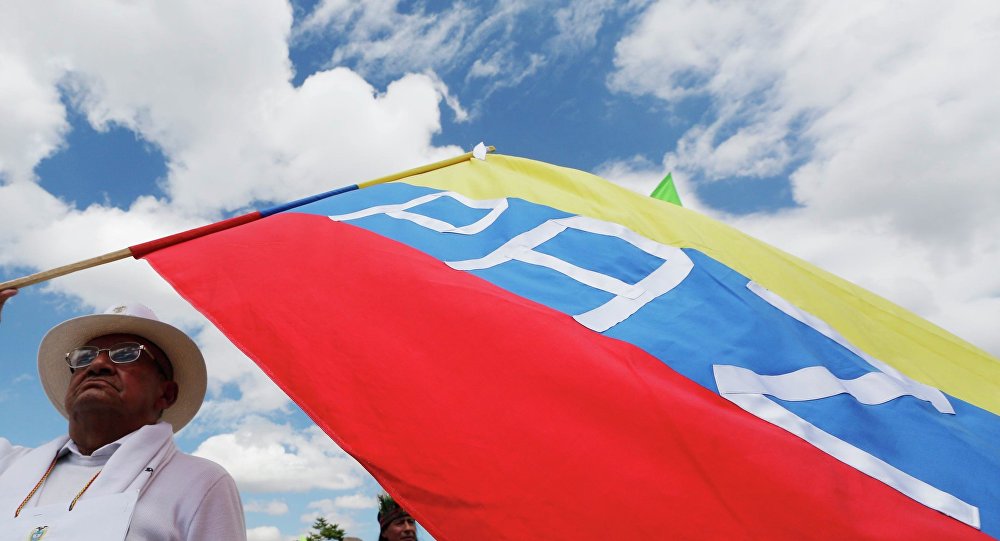On March 10, Colombian president Iván Duque objected to 6 of the 159 articles of the Statutory Law of the Jurisdicción Especial para la Paz (JEP) [Special Jurisdiction for Peace], which was presented to him for his approval, after being debated and passed by the legislature in 2017 and then revised by the Constitutional Court in 2018.
The JEP is a transitional justice system agreed upon in the peace agreements between the Revolutionary Armed Forces of Colombia (FARC) and the Colombian government under former president Juan Manuel Santos, signed in November 2016 in Havana, Cuba, which stipulated the demobilization and disarmament of more than 13,000 guerilla fighters. The JEP establishes a court to investigate, judge and sentence all those considered responsible for the crimes committed during a five-decade war between the guerilla forces and the Colombian security forces.
In response to the announcement by Duque the political party of FARC, now called Common Alternative Revolutionary Force declared: “Colombia should know that these objections are not in defense of the victims, that were never repaired by the State except in very few exceptions and that were never the worry of the Democratic Center [Party] nor Álvaro Uribe. Nor are they in defense of the public force, whose members have been expressly defending the JEP and demanding that the politicians that gave the horrible orders be held responsible”.
The articles objected by the president are related to an anticipated compensation by the perpetrators to the victims, the scope of the jurisdiction attributed to the High Commissioner for Peace, suspension of the proceedings of the ordinary courts in cases which comes under the jurisdiction of the JEP, criminal action against crimes against humanity, genocide or war crimes, extradition of persons for post-opt-out behavior to the signing of the Final Agreement and of other persons on offering truth without establishing any term or opportunity to do so.
On March 11, more than 100 members of the former FARC peace delegation sent a letter to the secretary of the United Nation requesting its urgent attention to this matter. “We express our deep concern about the attempts to seriously harm the implementation of the [Peace] Agreement, the structure and the functioning of the JEP, as well as the system designed to honor the rights of the victims. We are aware of the importance for our country and the world of the success of the peace process and its transitional justice model,” reads the letter.
On March 12, in response to the letter, the UN expressed its support for the JEP through an official communique. “Within the framework of international standards, we consider it essential that decisions on objections presented by the president of the Republic ensure that the integrity of the Final Agreement will be respected, as well as the judicial independence of the JEP,” states the communique.
After Duque had expressed his intentions of objecting a few articles in the law, the delegates from Cuba and Norway, the guarantor countries of the peace process, through an open letter urged the Colombian president to sanction the law as “it would be an essential step in the preservation and continuation of the final agreement reached”.
The Continental Peace Commission of Social Movements of ALBA released a statement manifesting their worry and rejection to Duque’s decision and categorized his declarations as part of “a long series of violations by the Colombian government to effectively carry-out what was negotiated in Havana with what today is the Alternative Revolutionary Common Force – FARC, including the lack of financing and sustaining of the ex-combatants that are in the Territorial Spaces of Training and Reincorporation, setbacks and central questionings of what was signed in December 2016 and the lack of guarantees for the security and political participation of both ex-combatants as well as social leaders, since the signing of the agreement and until today there have been almost 600 mortal victims”.
The right-wing government of Iván Duque, who has failed to provide protection to social and peasant leaders, who are repeatedly being targeted and killed by paramilitary forces operating in the country and who has failed to hold peace talks with the National Liberation Army (ELN), with this decision, seems to further aggravate the socio-political peace crisis in Colombia.





